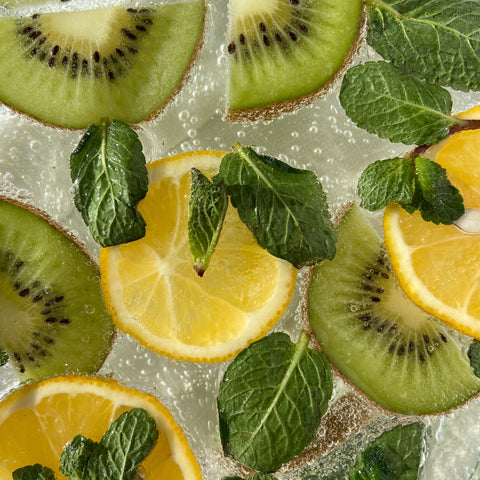How to Stay Hydrated Without Water this Summer
I’m sure there have been countless times where you’ve heard that you need to ensure you’re drinking at least 8 glasses of water a day, but what if you just can’t stomach the taste of plain water? Therefore struggling to keep up with your daily water intake and leaving yourself dehydrated in the process. Luckily, there are ways in which you can keep yourself hydrated that don't involve drinking water which can be seen as the best hydration drink. We’re going to share with you the ways in which you can feel your best self without having to gulp gallons of water.

First of all, we’re going to start off with the basics. Why is water so important for us? We know we need to drink it, and most certainly wouldn’t be able to survive without it. But what exactly is it doing for us in the long run?
Every living creature needs to have water to survive. Your body will stop operating correctly without water. Water constitutes more than half your body weight, and a human can't exist without it for more than a few days. Why? Your body has various vital tasks and many of them require water. Your blood, for example, which holds a lot of water, carries oxygen throughout all your body's cells. These little cells would perish without oxygen and your body would stop operating to its full potential. Here are our top tips on how to hydrate yourself this summer:
Why not try flavoured water if you don't like the taste of water for whatever reason? Sparkling water with no or low calories may help to satisfy the hydration requirements. Be sure to have no sugar or artificial sweeteners, when selecting a brand of sparkling water.

Another alternative is to infuse flavour into your own water. This is how:
Slice up your favourite fruit or vegetables such as watermelon, lemon or cucumber.
Sprinkle fruit or vegetable pieces in a big water pitcher overnight in the refrigerator.
The infusion of ice cubes is an alternative to drinking water by slices of fruit or vegetables. Place the pieces in an ice cube tray with water and freeze overnight. Dice up your preferred fruit or veggie pieces. Serve with a glass of water and give subtle flavour to your water as ice cubes mel
Milk is actually more effective than water at rehydrating and counteracting dehydration. It contains a natural combination of high-quality carbohydrates, proteins, and salt, which aids your body's ability to retain fluids. You may experiment with different milkshakes and smoothies, or you can go for buttermilk or lassi prepared with yoghurt.
Many foods are likewise rich in water content. There are several meals that can help you meet your daily water requirements. Some of the most hydrating foods (in terms of % water content) are:
- Cucumbers, cantaloupe, watermelon, lettuce, tomato, cabbage, celery, nonfat milk, spinach, squash/zucchini (90-99%)
- Apples, grapes, oranges, carrots, and broccoli(cooked) (80-89%)
- Bananas, avocados, cottage cheese, ricotta cheese, baked potato, fried corn, shrimp (70-79%)
- Legumes, salmon, ice cream, chicken breast, and spaghetti (60-69%)
Here are two ways for including more of these hydration-friendly items in your diet:
- To begin, always include vegetables in your meal. As you can see, fresh veggies like cabbage, celery, and cucumbers are high in water and are a simple method to meet your hydration requirements.
- Second, replace the starch-heavy spaghetti with zucchini noodles (which are about 95% water). With the addition of some spaghetti sauce or olive oil, you'll have a healthier and more hydrated dinner.
When it comes to changing up your hydration strategy, vegetable juices (without additional sugars) are a good alternative - and possibly a better one than fruit juices, which include natural sugars that enter your bloodstream rapidly after being stripped of their fibre during juicing. If liquified vegetables aren't your style, water-dense vegetables like cucumbers, bell peppers, lettuce, and celery may keep you hydrated as well.

Herbal teas, such as hibiscus tea, rose tea, or chamomile tea, are excellent hydrating beverages in the winter. You don't have to be concerned because they are caffeine-free and natural. They not only keep you hydrated, but they also soothe your fatigued nerves and rest your mind.
We hope you incorporate these tips into your lifestyle to help you to become more hydrated and feel like a better version of yourself in the long run!
